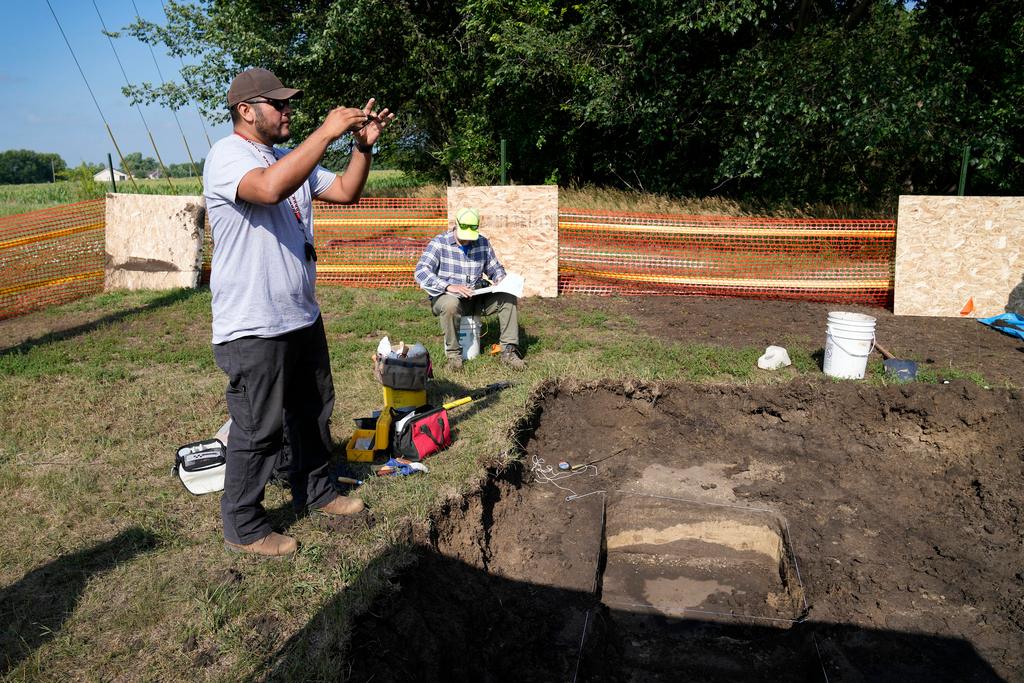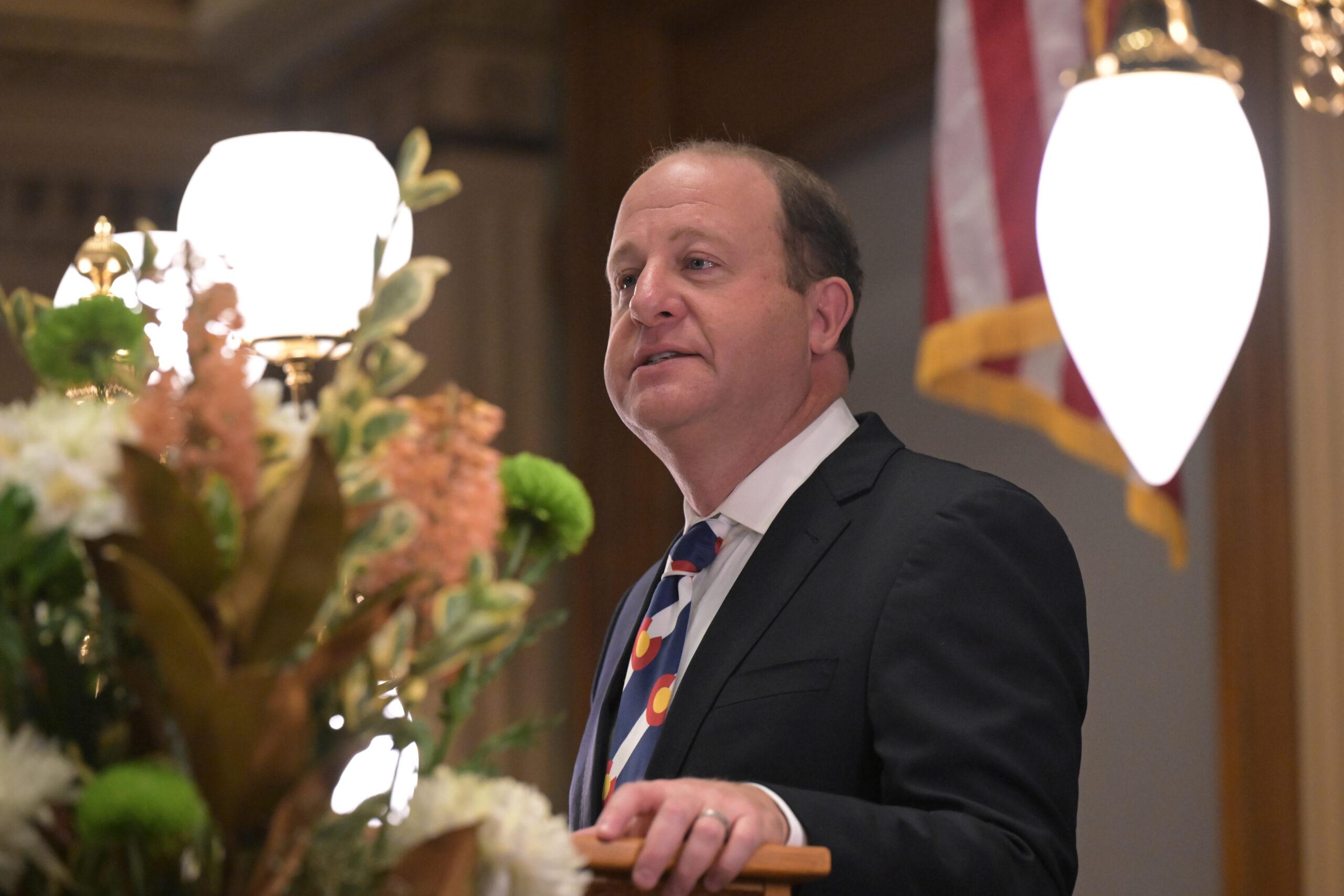
Democratic Governor Jared Polis delivered his vision for Colorado on Thursday, highlighting housing development and more transit options as two of his top policy priorities to make Colorado an easier, more affordable place to live.
The legislature met in a joint session in a crowded House chamber to hear the remarks, which also included some of the governor’s usual pop culture references, including an impression of Yoda and a joke about trying out for the Rockies.
However, overall, Polis’ nearly hour-long speech didn’t have a lighthearted tone. Inside the chamber, security was extra tight for the State of the State address, while outside the building, protesters shouted for a ceasefire in Gaza. At times chants from the demonstration could be heard inside the House chamber.
More from Gov. Polis: Colorado Matters goes deeper with the governor on passenger rail, taxes and what he didn't say in the State of the State
Polis, the state’s first Jewish Governor, did address the international political tensions impacting the nation and state.
“Sadly, in the last few months, there’s been a dramatic increase in horrific acts of hate across the world, including here at home,” said Polis.
“Between October 7 and January 7, the Anti Defamation League recorded a 360 percent increase in antisemitic incidents nationwide. The rise in antisemitism, Islamophobia, and hate in all forms is unacceptable in Colorado.”
Polis received a standing ovation for those remarks.
How policymakers engage with each other during these charged times has been a theme here at the early days of the annual legislative session.
During their opening day remarks, leaders in both political parties talked about the need for more civility and decorum at the capitol. Polis echoed that sentiment at the end of his speech and urged lawmakers to “disagree better.”
“When people start to paint the other side not as colleagues who disagree, but as enemies, we are entering dangerous territory,” he said.
Democratic Sen. Janet Buckner of Aurora said she thought Polis highlighted all of the right points during his address, but she wanted to hear even more about working together and collaboration.
“I wish that had been more at the beginning because that's what I'm hearing most from the community: How can you all work together as a legislature?” She added that she hopes this year will be better for all Coloradoans.
“I think we're just better when we work together.”
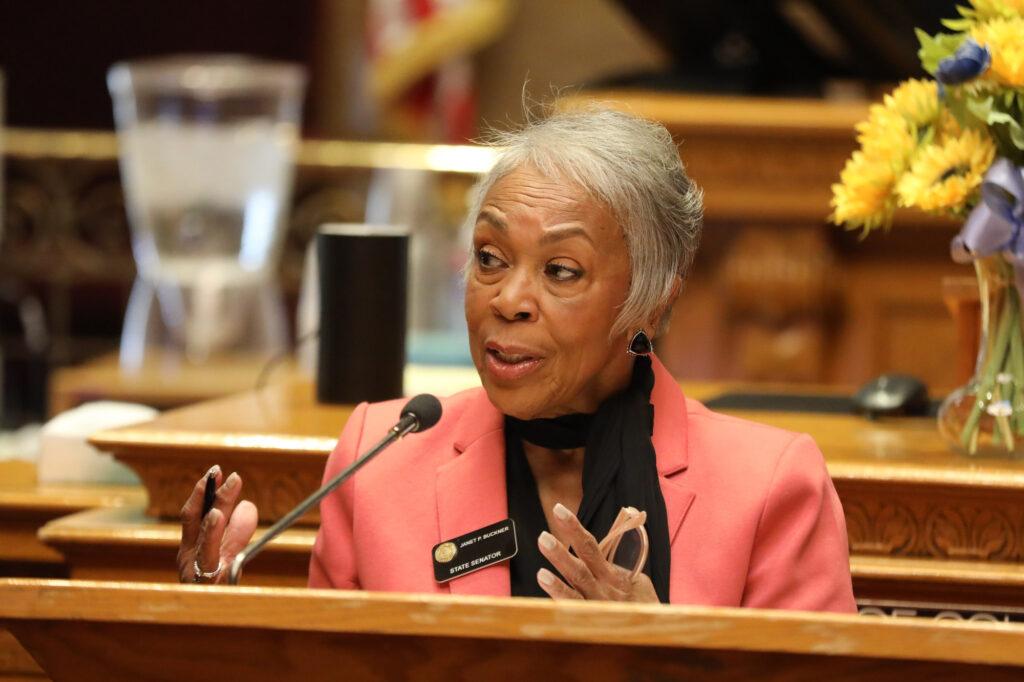
In principle, this is one area lawmakers on both sides of the aisle largely agree. Although, while every session starts with praises to bipartisanship, all of them also have moments of intense partisan discord. And many GOP members are highly skeptical this year will be any different. Lawmakers are in an election year, with every House seat and and half of the Senate up for election. Several lawmakers are also running for Congress.
Republican Rep. Brandi Bradley from Douglas County said she was glad the Governor addressed antisemitism in the speech.
“My best friend's Jewish. I think this hateful rhetoric is bad on both sides, so I appreciate him saying that,” said Bradley. “And I would like to have more respect. I would like to be respected more by my colleagues as well.”
She said it’s important to follow the rules and decorum of the chamber.
“I think the people of Colorado are looking at us to be the adults in the room,” she said.
Governor Polis begins the second year of his second term in office from a position of political strength. Democrats hold a near super majority in the state legislature and control every statewide elected seat, which means they don’t need GOP support to pass legislation, although it’s often a priority to try to get Republican buy-in when possible.
On housing: ‘It’s no surprise that the top issue everywhere is housing costs’
In this year’s speech, Polis continued his push to change how the state addresses growth. His signature package to change land use and zoning laws failed on the final day of the previous legislative session, after huge backlash from local governments.
He made it clear it’s an issue he’s not giving up on, saying there’s a real sense of hopelessness and despair in Colorado around housing.
“I hear from parents who fear their children will never own their own home here in Colorado. They aren’t alone, 83 percent of Colorado parents worry their children won’t be able to afford to live here,” said Polis.
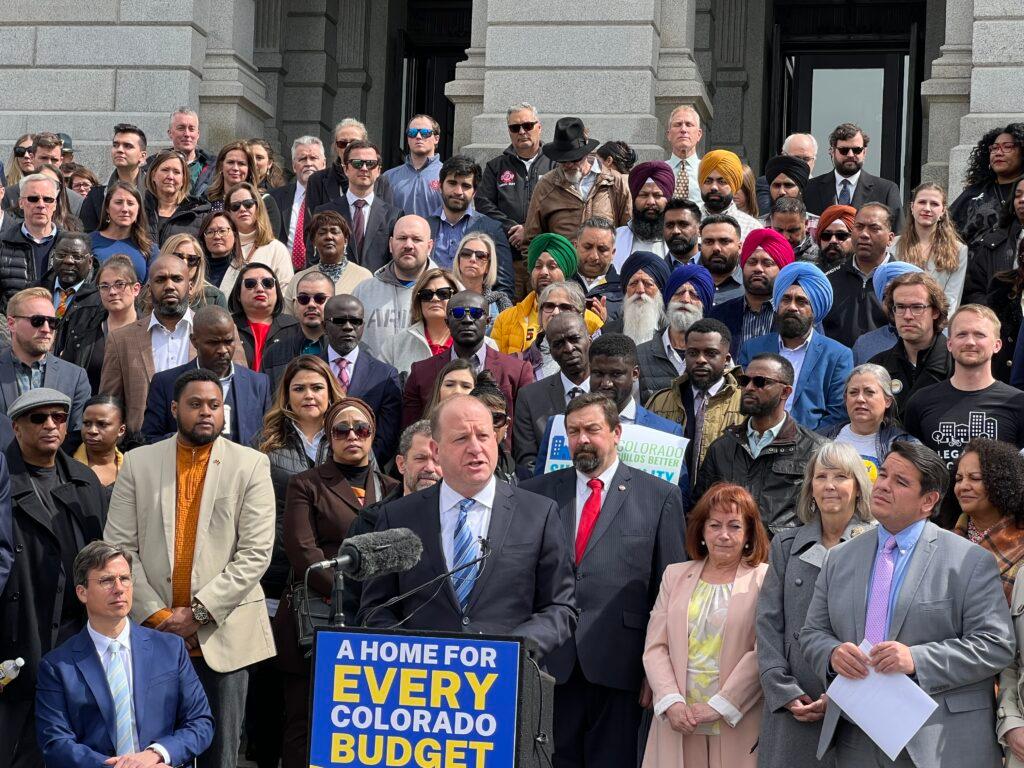
This year, Polis is asking the lawmakers to tackle the issue through a number of narrower bills. And he outlined specific policies he supports, including a measure to ban local occupancy restrictions in housing, which would allow more unrelated adults and families to live in rental homes.
Polis also backs allowing homeowners to build auxiliary dwelling units, or ADUs, on their property, “creating more housing supply that’s inherently affordable and filling critical gaps in our communities.”
Polis also said he would like to see the legislature create new financing strategies for housing construction, ease parking restrictions for new developments, tackle liability costs for multi-family condo construction and reduce the cost of fire insurance.
The Governor also said he supports making the Senior Homestead Property Tax Exemption portable, so seniors can continue to claim the tax exemption even if they downsize. Currently, the tax credit only kicks in after ten years in a home.
Republicans support that policy, but GOP Rep. Lisa Frizell said she didn’t think it would come to fruition, even with the Governor’s backing, noting that attempts to do so have failed before.
“So I do question the Democrats’ real commitment to what the governor is suggesting. My caucus is 100 percent behind that. Giving senior citizens property tax relief should be very important in making Colorado an affordable place to live for our seniors," said Frizell.
For Democratic Rep. Javier Mabrey, who has made housing affordability and renters rights a top priority during his first term in office, it was encouraging that Polis wants to address the housing crisis.
“People across the state who are renters are paying rents that are higher than many people pay for their mortgages. I see people paying $2,600 a month to live in Northglenn and Thornton, after they'd been priced out of Denver.”
Mabrey said he supports more ADUs but doesn’t think allowing more of them will have a massive impact on the affordability problem because they’re expensive to build.
“It costs homeowners 200 to 350 thousand dollars to build one of those ADUs. And so it's going to take a long time to get a critical mass of them to actually help the supply issue. But then on top of that, if they're investing that much money, are they really going to charge affordable rent?“
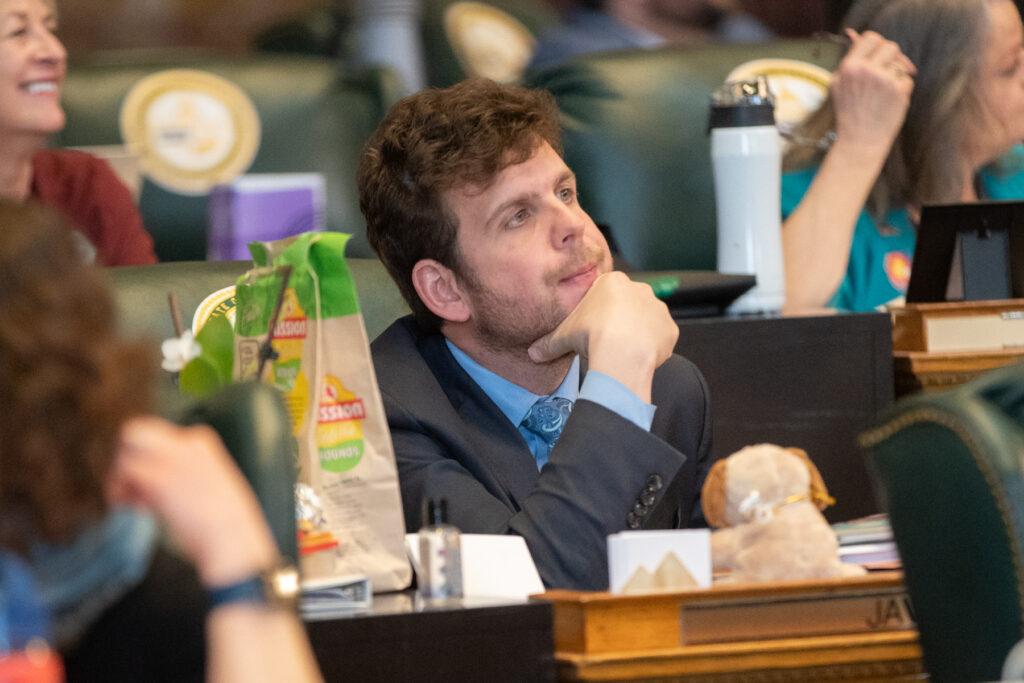
Mabrey said he wants to make sure lawmakers have a focus on policies that keep people in their homes and avoid displacement. However, some of the strategies he supports for that have been met with skepticism by Polis.
Last session Mabrey was the main sponsor of a bill that would have increased protections against eviction; among other things, it would have prevented landlords from refusing to renew a tenant’s lease without extenuating circumstances. That measure failed, but passing a version of it is a top priority for progressive lawmakers this year.
On transportation: ‘We have the planes, and we have the automobiles, we just need the trains.’
As part of a push for a denser but still liveable Colorado, Polis spoke about the need for more transit options near people’s homes, and more thriving communities with a mix of businesses, transit, and housing.
“Imagine leaving your home and heading to the train stop or bus station just a few blocks away. Maybe you walk or ride your bike. From there you ride to work in the morning in style. And because the schedule is reliable, you know exactly what time you’ll catch the train or bus to come home later that day. You don’t have to worry about whether you have enough gas, or if the roads will be icy,” Polis said, joking that his vision was a little like ‘Mr. Roger’s Neighborhood.’
Polis said developing transit oriented communities will increase housing affordability, reduce air pollution and increase productivity. He said he wants to set goals for new housing development that every community can work to achieve “in their own way.”
“The distance the average Coloradan drives per year has increased by more than 20 percent over the past 40 years,” said Polis, “and recent data shows that commuters in Denver were stuck in traffic for an average of 54 hours, more than an entire work week.”
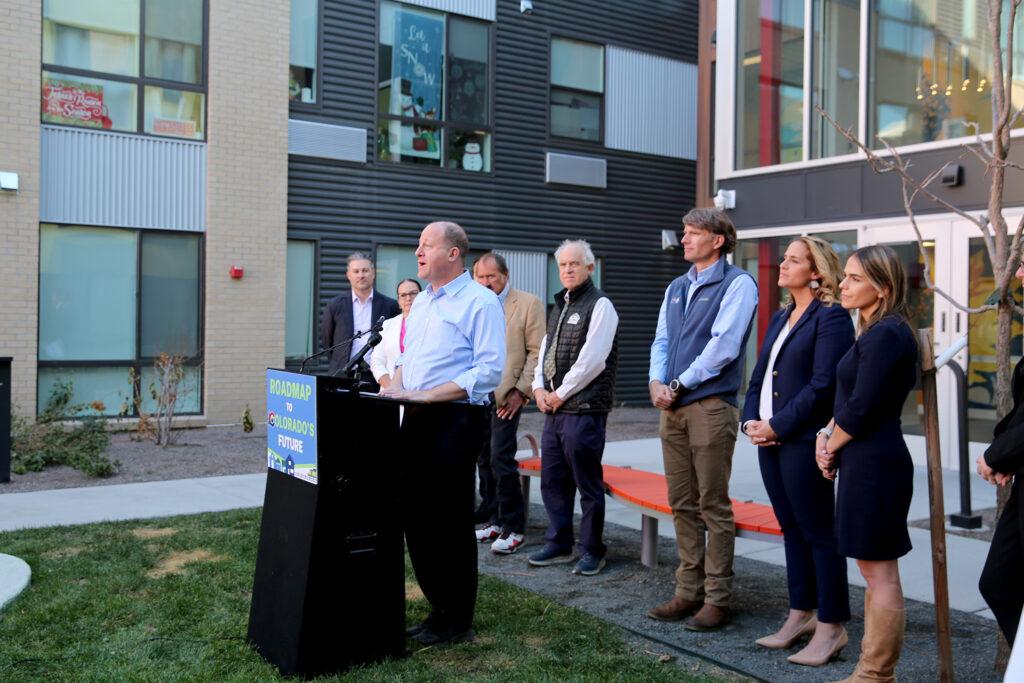
Polis also reiterated an idea he’s brought up before, that it’s time for a hard look at the Metro area’s Regional Transportation District.
“We must reexamine governance and operational efficiencies, expand local partnerships, build on the work of the RTD Accountability Committee, and give RTD and transit agencies across our state the tools, structure, and financial resources to deliver better service to more people,” said Polis.
Republican Assistant House Minority Leader Rose Pugliese said she wants more details.
“I want to see what low cost transit and housing near transit looks like. What that cost is. We have a lot of sound bites but not solutions necessarily we can afford,” said Pugliese, who represents part of El Paso County.
Pugliese also said lawmakers need to make sure to address the housing crisis in other parts of the state, not just the Front Range, and partnering with cities and counties. Until bills start being introduced, she remains doubtful.
“I want to see (bill) language — to see exactly if we're incentivizing governments, as opposed to taking away their local government control,” said Pugliese.
One of Polis’ more ambitious plans — which he compared to a ‘moon shot’ — is to majorly expand passenger rail in the state, establishing new routes into the mountains and along the Front Range. He said that after years of talk, the idea is finally possible, in part because of the $66 billion the federal government plans to invest in rail expansion across the U.S.
“It’s a question of whether Colorado will seize this opportunity and get our fair share of those federal dollars,” said Polis.
The governor also called on RTD to deliver on its long delayed promise of a train from Union Station in Denver to Boulder.
“The problem of unfinished public transit has gone on far too long, and taxpayers are sick and tired of paying for services they’re not getting.”
He said he backs legislative efforts to give transit agencies more resources and tools to “deliver better service to more people.”
On fiscal policy: ‘Cutting the income tax rate is the most effective way to further our economic growth.’
During a speech in which Democrats often had the loudest cheers in the room, they were notably quiet as Polis laid out his vision for fiscal policy reform in the state.
Polis returned to a pitch he has made year after year: that Colorado needs to reduce its income tax rate.
Colorado has a flat income tax, currently set at 4.4 percent, thanks to a voter-approved ballot measure.
Polis argued that another record year of TABOR refunds is proof that the state is collecting too many taxes in the first place and called for lawmakers to work across the aisle on a “bold and balanced and progressive” tax package.
“As demonstrated by our healthy surplus in Colorado, taxes are simply too high: income taxes, property taxes, and the state sales tax,” the governor said. “We ignore that signal at our own peril.”
Republicans gave Polis a standing ovation for that pitch. However, after the speech, many were pessimistic such a package could ever pass the Democratic controlled legislature.
“I know he believes in it, we've had several conversations,” said Rep. Pugliese. “But as a leader of the Democratic party in Colorado, if he can't get 20 Democrats to come to the table, I think we've got bigger problems.”
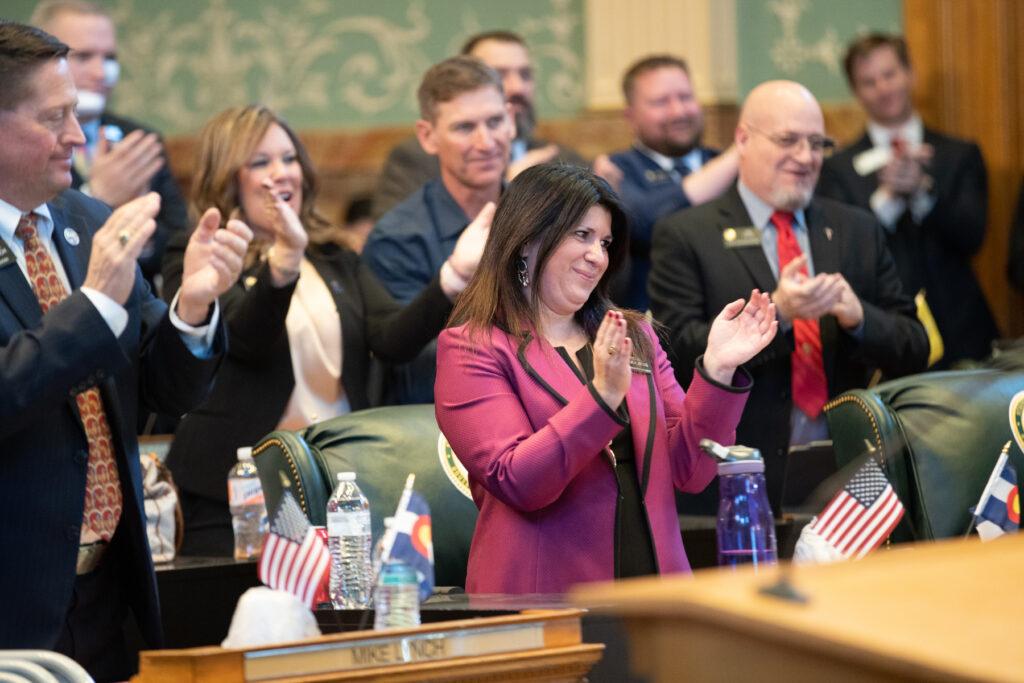
For their part, many Democrats argue that TABOR surpluses are a sign that spending limits are preventing the state from adequately funding schools, behavioral health and other needs. And they note that TABOR refunds can be paid equally to all taxpayers, while a lower income tax rate has more impact on higher wage workers.
“So when we're talking about cutting income tax, it's for people who are already well off. And I want to make sure that that is part of the conversation,” Rep. Mabrey said. “It is not going to help the people who are really struggling and the people who are really struggling need us to do everything in our power to help them.”
Polis also spoke about property taxes, which has received increasingly urgent attention from state politicians over the last year. Lawmakers were called into a special legislative session last fall following the failure of Prop. HH, which aimed to lower residential property tax rates. While the special session was productive in the eyes of Democrats, Polis doesn’t consider the work in that area finished.
“Thanks to your efforts, we're saving Coloradans money in the short term as we work together towards a long-term replacement to the Gallagher Amendment to keep property taxes low,” Polis said. “And I urge you to do as much as you can to reduce property taxes this session.”
On public safety: ‘Colorado is leading the nation in our work to prevent gun violence.’
Polis renewed his pledge to make Colorado one of the top ten safest states in the United States by 2027, and noted Colorado’s car theft rate dropped by a fifth from September 2022 to September 2023.
He also praised gun control bills that were passed last legislative cycle.
“Colorado is leading the nation in our work to prevent gun violence, whether it's strengthening our Red Flag laws, establishing waiting periods, requiring safe storage of firearms if kids are in the household or the work on banning ghost guns,” Polis said. “We're a model for the nation in practical common sense solutions to reduce gun violence while protecting our cherished Second Amendment rights.
Gun control bills passed in Colorado have been consistently challenged by gun rights groups. Earlier this month, a new law that made it illegal to put together an untraceable gun using a kit or 3-D printer was challenged within hours of taking effect.
Despite the uncertain legal climate, Polis said he hopes the state will build on prior gun control laws.
“We're proposing additional investments to prevent convicted felons from illegally purchasing firearms,” he said. “Each year, thousands of people who are prohibited from purchasing a firearm try to do so illegally and as a state when you stand firm and crack down on illegal firearm activity.”







